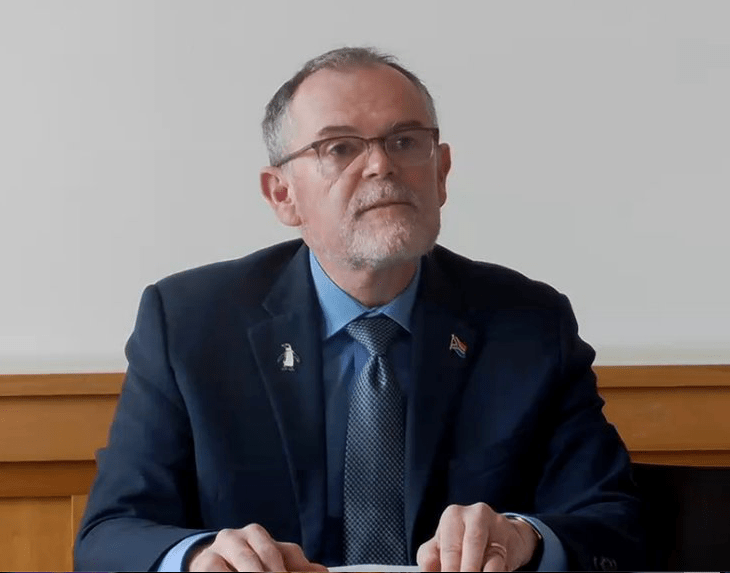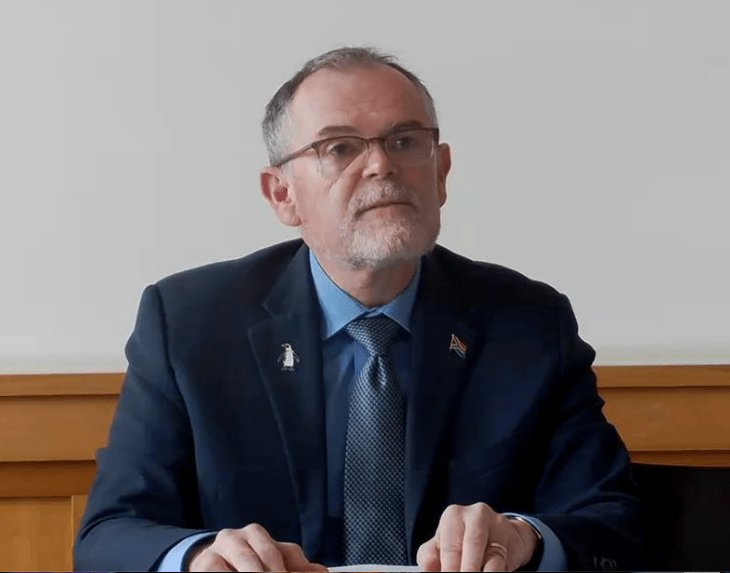
Cameroon timber

Minister Dion George. (Photo: Environmentza/X)
Forestry, Fisheries and the Environment Minister Dion George has granted limited exemptions to Eskom allowing it to breach air pollution limits at eight of its coal-fired power stations under a rigorous set of conditions.
Kendal, Lethabo, Tutuka, Majuba, Matimba and Medupi were each granted exemptions, capped at five years, from complying with the minimum emission standards expiring on 1 April 2030.
The standards are legally mandated limits on the amount of pollutants, including sulphur dioxide, particulate matter and oxides of nitrogen, that can be emitted into the atmosphere as outlined in the Air Quality Act.
Exemptions were granted for Duvha and Matla until their planned shutdown dates of 21 February 2034 and 20 July 2034, respectively, aligning with Eskom’s decommissioning schedule.
At a media briefing on Monday, George emphasised that the limited exemptions “are not a blanket reprieve” but are “tailored to each facility”, with stringent conditions to mitigate the effects of non-compliance with the minimum emission standards.
In December, Eskom applied for exemptions from the standards for the eight power stations.
“According to the law, if I did not give exemptions to Eskom, they would be operating illegally from tomorrow [1 April], which would mean that they would actually need to shut down,” George said. “Now, of course, that is not in anybody’s interest. We’re working with what we have; not with what we wish we have … You cannot grow an economy in the dark, you cannot live in the dark.”
He said the power utility plays a critical role in the country’s energy security, but its coal-fired operations have significant environmental and health implications, which he was duty-bound to address. Balancing these imperatives — energy security, economic stability and environmental protection — guided his decision.
The minister decided to grant the limited extensions after considering Eskom’s submissions, the report of the national environmental consultative and advisory forum in March last year and an expert report in March, together with inputs from, among others, the Centre for Environmental Rights.
For Duvha and Matla, the timeline acknowledged their critical role in energy security while ensuring that their operational lifespan was not extended beyond what is necessary, George said. “It provides Eskom adequate time to transition these facilities out of service responsibly, contingent on the rapid expansion of renewable energy capacity to maintain stability.”
The five-year exemption for Kendal, Lethabo, Majuba, Medupi, Matimba and Tutuka reflects a commitment to minimising environmental harm, “given prior postponements granted to Eskom”, and the urgent need to transition to renewable energy amid climate change imperatives and South Africa’s international commitments under the Paris Climate Agreement.
Exemptions for power stations
Duvha received a minimum emission standards exemption until its planned decommissioning date of 21 February 2034. The exemption acknowledges that the power station’s ageing infrastructure makes retrofitting for full compliance impractical, given its finite operational lifespan.
But this is not a free pass, George said, noting that Eskom must adhere to strict conditions to mitigate the station’s environmental impact until it is phased out.
Matla’s scheduled decommissioning on 20 July 2034 is consistent with Eskom’s long-term plan. “This longer timeframe recognises Matla’s critical role in the energy supply chain, particularly its linkage to nearby mining operations, while ensuring that its environmental impact is curtailed through mandatory health and air quality measures.”
Kendal was granted a five-year exemption, which expires on 1 April 2030. George said this decision balanced Kendal’s significant contribution to the national grid with the pressing need to reduce emissions from one of Eskom’s higher-emitting facilities. Eskom is required to implement targeted emission reduction measures and accelerate renewable energy integration to offset Kendal’s environmental footprint.
Lethabo’s five-year exemption is set to conclude on 1 April 2030. The station’s proximity to populated areas necessitates immediate action on health interventions and air quality transparency, which are non-negotiable components of this exemption, the minister said.
George approved a five-year exemption for Majuba, ending on 1 April 2030. The power station’s strategic importance to the grid is “undeniable yet its emissions remain a concern”, he said. “This exemption reflects a pragmatic approach, allowing Eskom time to enhance operational efficiency and explore flexibilisation options while adhering to stringent monitoring and mitigation requirements.”
Matimba was granted a five-year exemption, expiring on 1 April 2030. “Located in a water-scarce region, Matimba’s dry-cooling technology offers some environmental advantages, but its coal-based emissions still require oversight,” George said, adding that the exemption period ensures energy security while mandating Eskom to implement socio-economic offsets and emission reduction studies.
Tutuka received a five-year exemption, which expires on 1 April 2030. “Tutuka’s operational challenges and emissions output necessitate immediate mitigation measures, which are embedded in the exemption’s conditions.”
Medupi was granted a five-year exemption until 1 April 2030. Despite its modern design, Medupi has faced delays in achieving full minimum emission standards compliance, notably with the installation of flue gas desulphurisation (FGD) technology. The exemption mandates a revised cost-benefit analysis for FGD within six months, alongside other conditions to minimise emissions.
“The reason I decided the way I did is that apparently there was some concern by Eskom, maybe others, that this is an incredibly expensive exercise apparently … so I want a cost-benefit analysis, another one must be done within six months and it must be done properly and I want to have a close look at it and I will do that … because I can actually count and I do know how finance works.”
Key conditions
The exemptions “come with rigorous conditions”, which Eskom must implement at both fleet and plant levels, George said.
For the health interventions, Eskom must have air quality monitoring stations and a data-free alert app within eight months; appoint an environmental health specialist within three months; and extend community health screening programmes within six months. Mobile clinics and green space initiatives will further support affected communities.
Regarding socio-economic measures, Eskom is directed to expedite its offset programmes, expand interventions to 96 000 households within 12 months and address waste and ash dumps near power stations.
To improve air quality transparency, real-time emissions data must be published immediately, with additional monitoring stations installed within 12 months.
Eskom is to submit an annual report, due by the end of March each year, detailing progress on facilitating the integration of renewable energy into the grid, supporting the acceleration of licensing processes for new renewable projects, and ensuring sufficient renewable capacity is available to replace coal-fired plants as they are phased out.
‘Cleaner, healthier future’
The conditions, which will be incorporated into Eskom’s atmospheric emission licences, “ensure accountability and progress toward compliance”, said the minister. “I have assessed that they will not precipitate load-shedding, preserving energy security while advancing environmental goals.
“This decision reflects a pragmatic yet principled approach … It is not an endorsement of indefinite non-compliance but a bridge to a cleaner, healthier future.”
There would be ongoing review, and any breach may result in exemption withdrawal.
George will now hold discussions with Energy and Electricity Minister Kgosientsho Ramokgopa and Eskom.
“What we want to do is to make sure that Eskom can, in fact, comply. We’re not out to squeeze Eskom to the point where they’re not able to operate obviously … There have been many things that have been happening in the past where things were supposed to happen and did not. That time is now over.
“Eskom did ask for longer periods [not to comply]. They did not get it. I decided on five years because five years is very reasonable. I had a look at the expert report, I had a look at the financials of Eskom and I thought about it for a long time in terms of what is reasonable and we have to balance our constitutional right to clean air with the fact that we want to have energy in our grid.
“We know that Eskom has been dragging its feet on transmission and new independent producers … it’s something that must end because there is no point in having a monopoly that is not able to actually provide the energy … What is in everybody’s interest is that Eskom must evolve with the environment as it’s unfolding.”
There are financial implications for Eskom to the “very vigorous conditions” he had set. “I have absolutely every intention of holding them to account … It certainly puts them under pressure and that is actually my intention because more of the same is not going to work that is the point.
“And then of course like everyone else, the 251 people that are suing the department at the moment … let’s first have a conversation before we go down that road, because it’s very expensive, takes forever and my department will win ultimately.”
In March, a study by the South African Medical Research Council found that people living in district municipalities with coal-fired power stations are at a 6% higher risk of experiencing health problems caused by air pollution compared to those without.
“Cardiovascular diseases are a major cause for concern in these areas. Children under five are particularly vulnerable, as there is a direct increase in pneumonia cases with every 10 parts per billion rise in nitrogen dioxide and sulphur dioxide levels. Some babies are affected before birth, with higher cases of cleft lip and palate anomalies in areas with coal-fired power stations,” the council said.
George said: “All we want to do here is we want enough electricity to grow our economy and we want clean breathable air because it is completely unacceptable that our children have problems with their lungs and babies are born with cleft palates because of the filthy air their mothers are breathing.
“Nobody will accept that and I certainly won’t and that’s why we’re putting in the health conditions there because we do care about our people.”

